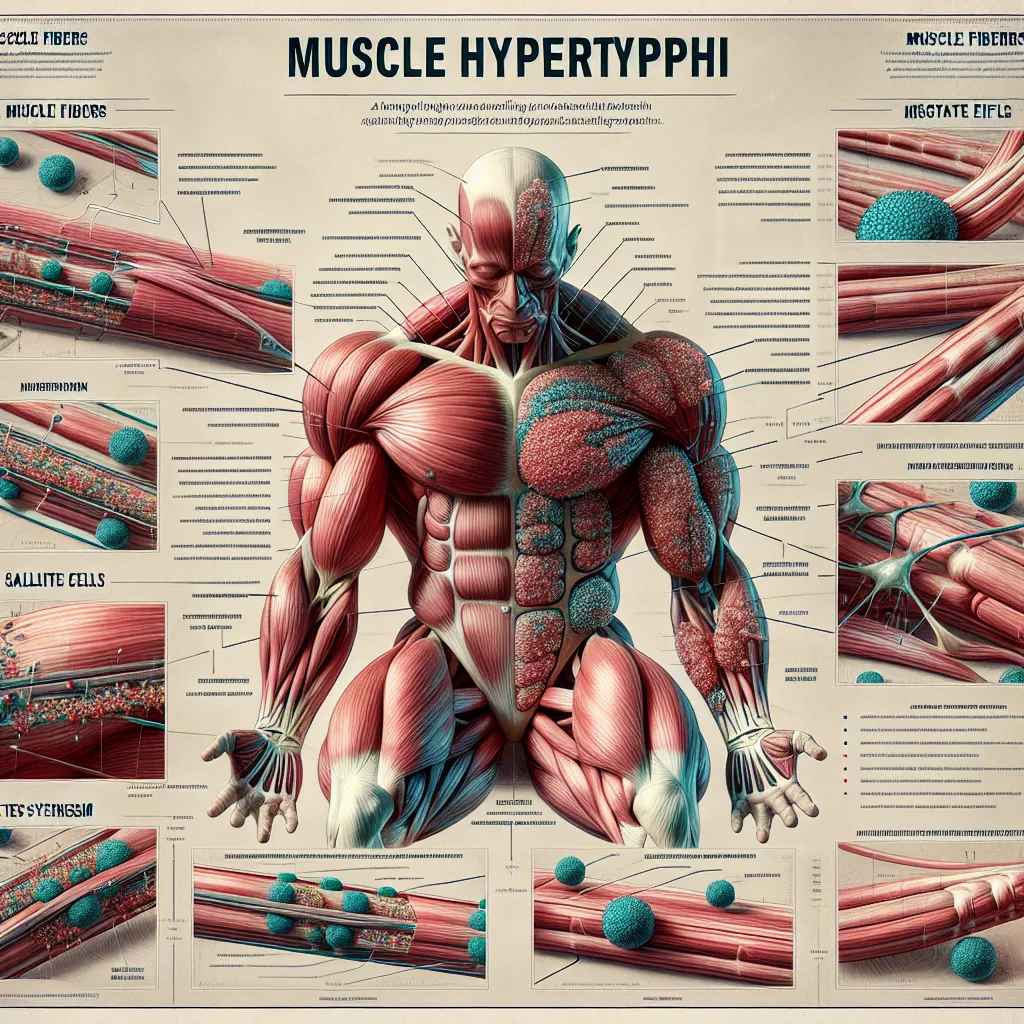Muscle hypertrophy /ˈmʌsl haɪˈpɜːtrəfi/ (noun): The enlargement of muscle fibers due to increased protein synthesis or decreased protein breakdown.

Understanding the Context of ‘Muscle Hypertrophy’
Examples in Context
-
Resistance training is a key factor in promoting muscle hypertrophy.
In this sentence, ‘muscle hypertrophy’ is used to describe the desired outcome of resistance training. It emphasizes the relationship between exercise and muscle growth. -
The athlete’s rigorous workout routine resulted in significant muscle hypertrophy over six months.
Here, ‘muscle hypertrophy’ is used to indicate a measurable change in muscle size as a result of consistent training. -
Researchers are studying the molecular mechanisms behind muscle hypertrophy to develop more effective exercise protocols.
This example showcases the use of ‘muscle hypertrophy’ in a scientific context, highlighting its relevance in research and exercise science. -
Proper nutrition is essential for maximizing muscle hypertrophy during a bulking phase.
The term is used here to connect dietary habits with muscle growth, emphasizing the importance of nutrition in achieving hypertrophy. -
Genetic factors can influence an individual’s potential for muscle hypertrophy.
This sentence introduces the concept that muscle growth can be affected by genetic predisposition, broadening the understanding of the term.
Common Contexts
‘Muscle hypertrophy’ is frequently encountered in:
- Fitness and bodybuilding literature
- Sports science and exercise physiology textbooks
- Nutritional studies related to muscle growth
- Medical research on muscle disorders and treatments
Frequency in IELTS
While ‘muscle hypertrophy’ is a specialized term, it may appear in IELTS Academic Reading passages related to health, sports science, or biology. It’s less likely to be required in Writing or Speaking tasks unless the topic specifically relates to exercise science or physical training.
Analyzing ‘Muscle Hypertrophy’
Word Structure
- Muscle: The tissue being discussed
- Hypertrophy: From Greek ‘hyper’ (excessive) + ‘trophe’ (nourishment)
Synonyms and Antonyms
Synonyms:
- Muscle growth
- Muscular enlargement
- Muscle building
Antonyms:
- Muscle atrophy
- Muscular deterioration
- Muscle wasting
Memorization Techniques
Mind Mapping
Create a mind map with ‘Muscle Hypertrophy’ at the center, branching out to related concepts:
- Resistance training
- Protein synthesis
- Hormonal factors (e.g., testosterone, growth hormone)
- Nutrition (protein intake, caloric surplus)
- Recovery and rest
Imagery Technique
Visualize a muscle fiber as a balloon. As you ‘pump’ it with exercise and proper nutrition, it grows larger, representing hypertrophy. This image can help cement the concept in your mind.
Practical Application
Exercise 1: Sentence Formation
Create sentences using ‘muscle hypertrophy’ in different contexts:
- Scientific: “The study aimed to investigate the effects of different protein sources on muscle hypertrophy.”
- Fitness advice: “To maximize muscle hypertrophy, ensure you’re progressively overloading your muscles during workouts.”
- Nutritional context: “Adequate protein intake is crucial for supporting muscle hypertrophy post-exercise.”
Exercise 2: IELTS-style Reading Comprehension
Read the following passage and answer the questions:
“Muscle hypertrophy is a complex physiological process that occurs in response to specific stimuli. While resistance training is the primary driver of muscle hypertrophy, other factors such as nutrition, hormonal balance, and genetic predisposition play significant roles. Recent studies have shown that the frequency and volume of training can significantly impact the rate of muscle hypertrophy, with some research suggesting that training each muscle group twice per week may be optimal for most individuals. However, the relationship between training variables and muscle hypertrophy is not linear, and more is not always better. Overtraining can lead to diminished returns and potentially muscle breakdown.”
Questions:
- What is the main stimulus for muscle hypertrophy according to the passage?
- How often does the passage suggest training each muscle group for optimal results?
- What potential negative outcome of excessive training is mentioned?
Answers:
- Resistance training
- Twice per week
- Muscle breakdown
Conclusion
Understanding ‘muscle hypertrophy’ is crucial for anyone interested in fitness, sports science, or biology. By breaking down the term, exploring its contexts, and practicing its usage, you can confidently incorporate this specialized vocabulary into your IELTS preparations and beyond. Remember, consistent exposure and application are key to mastering new terminology.
We encourage you to practice using ‘muscle hypertrophy’ in your own sentences and discussions. If you have any questions about this term or how to use it effectively in your IELTS preparation, please feel free to ask in the comments section below.